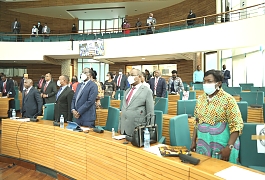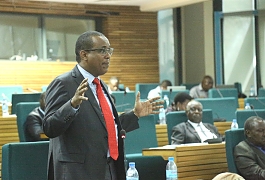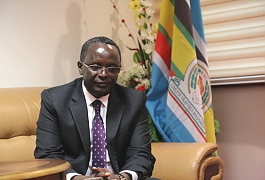Members of the East African Legislative Assembly (EALA) shall tomorrow commence public hearings on the Trans- Boundary Ecosystems Bill 2010 as well as undertake tours of selected EAC Aquatic and Terrestrial Ecosystems in the region.
The meetings run from May 4-14, 2011 and shall see EALA’s Committee on Agriculture, Tourism and Natural Resources (ATNR) visit the Partner States’ capitals and other regions during the exercise. The objectives of the public hearings are to undertake a comprehensive review of the EAC Transboundary Ecosystem Bill 2010 and to solicit the stakeholders’ input to enrich the EAC Bill.
The Committee shall be divided into two teams. Team one is headed by Hon. Kate S. Kamba. The delegation shall visit Bujumbura, Nairobi, Dar es Salaam and the Lake Jipe, covering Moshi and Taveta regions. Hon. Mike Sebalu, EALA MP, leads the second team that is expected to cover Kigali, Kampala, Dar Es-Salaam and the Kilimanjaro/Amboseli regions.
During the two weeks, the EALA Members are expected to meet with representatives of national Environment Management Authorities, environmental Civil Society Organizations, the media, academia and conservation Agencies. The Members shall also visit the Lake Jipe Aquatic shared ecosystem that cuts through Kilimanjaro-Tanzania and Taita -Taveta area in Kenya and the Kilimanjaro/Amboseli Terrestrial shared ecosystem. The visits are to be preceded by a meeting in Moshi, Tanzania between the legislators and stakeholders of the Lake Jipe Trans-boundary ecosystems, Taita/Taveta county council, local government officials, and representatives of communities living within the ecosystem among others.
Meanwhile, the General Purpose Committee of EALA is expected to meet from 8-14th May 2011 to assess the progress and challenges for the EAC budget for Financial Year 2010/2011 and also analyze the priorities set for the EAC Budget for the Financial Year 2011/2012. It is anticipated that the Budget reading will take place in the 1st Week of the May 2011 at the plenary meeting in Arusha.
At the same time, another EALA Committee, the Committee on Regional Affairs and Conflict Resolution (RACR) convened to consider the EAC Bill on Conflict Prevention and the EAC Bill on Civic Education. The Bill on Conflict Prevention seeks to establish within the East African Community, a Conflict Management Commission responsible for among others, the identification of potential sources of conflict and devise response options, provision of pre-emptive measures to address conflict situations, operationalization of a conflict early warning and response mechanism for the EAC and development of capacity for mediation and negotiation to forestall and diffuse conflicts; proposing modalities for intervention and stabilization of conflict situations.
The EAC Bill on Civic Education on its part aims to make provision for the establishment of a Directorate to disseminate properly co-ordinated Civic Education in the East African Partner States to promote people centredness.
Generally, all the aforementioned Bills are still at their infancy stages. Once the Committees complete the process of consideration of the said Bills, they shall be submitted to the Counsel to the Community for legal opinion whether they are in order or not before they are referred to the main House. Upon consideration by the House, the Committees can then seek leave to prepare the Bills for the first reading after consultation with stakeholders and other experts in the subject.
The seven standing Committees of EALA include the House Business Committee, Committee on Communications, Trade and investment (CTI), the Regional Affairs & Conflict Resolution (RACR) and the Legal, Rules & Procedures Committee. Others are the Agriculture, Tourism & Natural Resources Committee; General Purpose Committee and the Accounts Committee.
Rule 77 of the Rules of Procedure of the Assembly provides for the appointment of relevant committees necessary for the efficient discharge of the Assembly’s functions. Their roles include examining, discussing and making recommendations on all Bills laid before the Assembly and initiating Bills within their respective mandates.
NOTE TO THE EDITORS
The East African Legislative Assembly is the legislative organ of the East African Community. Its Membership consists of a total of 52, of whom 45 are elected Members (9 from each Partner State) and seven ex-officio members (the Ministers responsible for EAC Affairs from the Partner States, the Secretary General of the Community and the Counsel to the Community).
The East African Legislative Assembly has legislative functions as well as oversight of all East African Community matters. The enactment of legislation of the Community is effected by means of Bills passed by the Assembly and assented to by the Heads of State, and every Bill that has been duly passed and assented to become an Act of the Community and takes precedent over similar legislations in the Partner States.
-End-
For more Information, contact: Bobi Odiko, Senior Public Relations Officer; East African Legislative Assembly; Tel: +255-27-2508240 Cell: +255 787 870945, +254-733-718036; Email: bodiko@eachq.org



